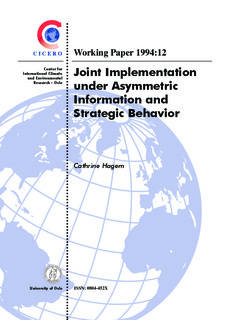Joint Implementation under asymmetric information and strategic behaviour
Working paper
Permanent lenke
http://hdl.handle.net/11250/192208Utgivelsesdato
1994Metadata
Vis full innførselSamlinger
- CICERO Working Papers [167]
Sammendrag
Joint Implementation (JI) under the Framework Convention of Climate Change means that countries could partly offset their national abatement commitments by investing in CO2 abatement projects abroad. JI is introduced as a mechanism for achieving a certain global abatement target less costly by separating the commitments from the implementation of measures. This paper studies the design of a JI contract when the investor has incomplete information about the foreign firm which carries out the JI project (the host). Asymmetric information leads to a decrease in the potential costsavings from JI. Furthermore, private information held by the potential host firm could give the firm a significant positive utility of participating in JI projects. The possibility of being a host for a JI project in the future can prevent potential host firms from investing in profitable abatement projects today. The paper analyzes the impact on emissions of CO2 of strategic behavior among potential hosts for JI projects.
